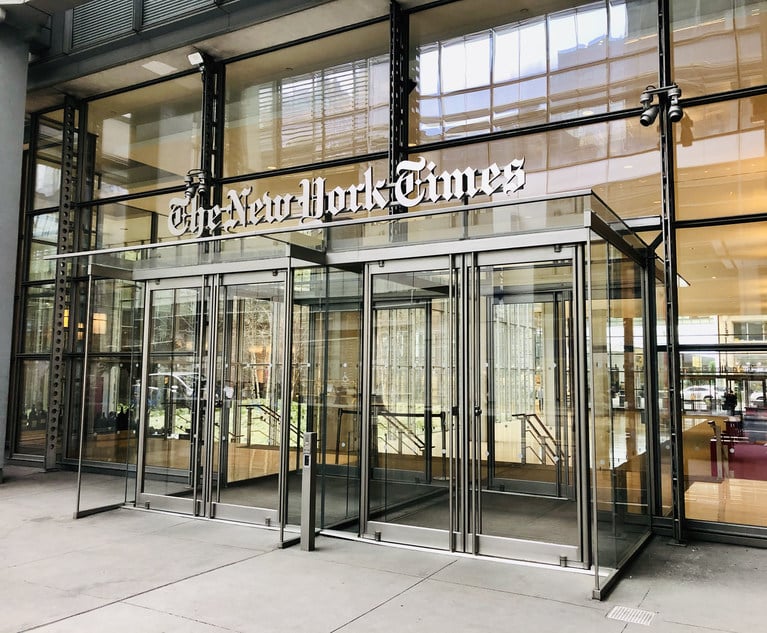'Curve Flattens' for ADA Website-Accessibility Lawsuit Filings, Seyfarth Report Says
For sure, 2019 saw a lot of new suits. But on a year-over-year basis, it was "flat," said two Seyfarth Shaw partners who track the number of federal suits filed nationally. By contrast, from 2017 to 2018 there was "an explosive 177% increase" in the number of suits, from 814 to 2,258.
May 06, 2020 at 11:38 AM
4 minute read
 Americans with Disabilities Act/Creator: designer491/Shutterstock.com
Americans with Disabilities Act/Creator: designer491/Shutterstock.com
After explosive growth in the number of American with Disabilities Act website-accessibility lawsuits launched in 2018, it appears that the once-rising tide of litigation has leveled off, according to Am Law 100 firm Seyfarth Shaw.
In 2019, there were 2,256 ADA website-accessibility lawsuits filed in the nation's federal courts, as compared with just two more (2,258) in 2018, according to Seyfarth labor and employment partners Minh Vu and Kristina Launey, who keep a tally of various ADA suits lodged by the federal courts and who blog about their findings.
The title of their recent blog post on the latest year-over-year data: "The Curve Has Flattened for Federal Website Accessibility Lawsuits."
For sure, 2019 saw a lot of new suits. But on a year-over-year basis, it was "flat," the blog authors said. By contrast, from 2017 to 2018 there was "an explosive 177% increase" in the number of suits, from 814 to 2,258.
But one thing did not change about the 2019 numbers: New York's federal court system continued to be the dominant place for filing the website-accessibility suits, just as it had been in recent years, according to Seyfarth.
The Empire State saw 1,354 federal website-accessibility suits launched in 2019, down from 1,564 in 2018.
Meanwhile, said Seyfarth, Florida held steady to its position as the jurisdiction with the second-highest total of newly filed accessibility suits. It saw 526 lodged in 2019, down from 576 in 2018.
In a flipping of the script for the distant third and fourth positions on the list, however, California (120 new suits) and Pennsylvania (92) moved up past Illinois (91) and Massachusetts (33) in 2019 for those spots. At the same time, the number of website-accessibility actions for all four of those states more than doubled in 2019 when compared to 2018, said Vu and Launey's blog post.
 Credit: Seyfarth
Credit: SeyfarthIn highlighting more of their findings, the partners pointed to the lack of any "surge" in new cases, once the U.S. Supreme Court decided it would not review the U.S. Court of Appeals for the Ninth Circuit's pro-plaintiff Robles v. Domino's decision in the area of website-accessibility litigation.
Vu and Launey noted that they'd predicted a no-review of the Robles decision would lead to an increase in case filings. But the partners reported that before the Supreme Court's Oct. 7, 2019, refusal to hear the case, an average of seven lawsuits were filed a day. After the Oct. 7 date, four a day were lodged on average.
They also reported that "while the greatest number of suits were filed in July and August (258 and 270, respectively), monthly filings then decreased by nearly half for each of the last four months of the year."
In 2020 so far, they added, "the number of filings went back up for the first three months … but were still lower that the number of filings in the same months in 2019."
Over the last decade, the growing website-accessibility area of litigation—in which disabled people, citing the ADA, sue websites that allegedly aren't coded to work with assisting technologies such as screen readers—has generated controversy.
As the litigation has grown rapidly over the last decade, some have publicly criticized what they see as a plaintiffs lawyer-driven glut of suits that seem mostly geared toward collecting attorney fees, especially when some states impose seemingly low caps on amounts plaintiffs can recover.
But in a 2019 interview with the New York Law Journal, Joseph Mizrahi of Brooklyn-based law firm Cohen & Mizrahi, a leading New York firm in bringing website-accessibility suits, defended the need for the tide of litigation.
"We have many clients and over the course of their lives they have visited many websites that they cannot access, and they want to enjoy the internet just like anybody else does," he said in the interview.
The ADA statute "allows for attorney fees, [and] there is a lot of work that goes into preparing, litigating and monitoring compliance," he also said. Then he asked rhetorically, "So which attorney is going to work for free?"
This content has been archived. It is available through our partners, LexisNexis® and Bloomberg Law.
To view this content, please continue to their sites.
Not a Lexis Subscriber?
Subscribe Now
Not a Bloomberg Law Subscriber?
Subscribe Now
NOT FOR REPRINT
© 2025 ALM Global, LLC, All Rights Reserved. Request academic re-use from www.copyright.com. All other uses, submit a request to [email protected]. For more information visit Asset & Logo Licensing.
You Might Like
View All
‘Issue of First Impression’: New York Judge Clears Coinbase Appeal Amid Crypto Regulatory Clash
4 minute read
New York Times Moves for $100K in Attorney Fees Against Dfinity Foundation
3 minute read
Health Care Data Breach Class Actions Saw December Surge in NY Courts

Law Firms Mentioned
Trending Stories
- 1Reviewing Judge Merchan's Unconditional Discharge
- 2With New Civil Jury Selection Rule, Litigants Should Carefully Weigh Waiver Risks
- 3Young Lawyers Become Old(er) Lawyers
- 4Caught In the In Between: A Legal Roadmap for the Sandwich Generation
- 5Top 10 Developments, Lessons, and Reminders of 2024
Who Got The Work
J. Brugh Lower of Gibbons has entered an appearance for industrial equipment supplier Devco Corporation in a pending trademark infringement lawsuit. The suit, accusing the defendant of selling knock-off Graco products, was filed Dec. 18 in New Jersey District Court by Rivkin Radler on behalf of Graco Inc. and Graco Minnesota. The case, assigned to U.S. District Judge Zahid N. Quraishi, is 3:24-cv-11294, Graco Inc. et al v. Devco Corporation.
Who Got The Work
Rebecca Maller-Stein and Kent A. Yalowitz of Arnold & Porter Kaye Scholer have entered their appearances for Hanaco Venture Capital and its executives, Lior Prosor and David Frankel, in a pending securities lawsuit. The action, filed on Dec. 24 in New York Southern District Court by Zell, Aron & Co. on behalf of Goldeneye Advisors, accuses the defendants of negligently and fraudulently managing the plaintiff's $1 million investment. The case, assigned to U.S. District Judge Vernon S. Broderick, is 1:24-cv-09918, Goldeneye Advisors, LLC v. Hanaco Venture Capital, Ltd. et al.
Who Got The Work
Attorneys from A&O Shearman has stepped in as defense counsel for Toronto-Dominion Bank and other defendants in a pending securities class action. The suit, filed Dec. 11 in New York Southern District Court by Bleichmar Fonti & Auld, accuses the defendants of concealing the bank's 'pervasive' deficiencies in regards to its compliance with the Bank Secrecy Act and the quality of its anti-money laundering controls. The case, assigned to U.S. District Judge Arun Subramanian, is 1:24-cv-09445, Gonzalez v. The Toronto-Dominion Bank et al.
Who Got The Work
Crown Castle International, a Pennsylvania company providing shared communications infrastructure, has turned to Luke D. Wolf of Gordon Rees Scully Mansukhani to fend off a pending breach-of-contract lawsuit. The court action, filed Nov. 25 in Michigan Eastern District Court by Hooper Hathaway PC on behalf of The Town Residences LLC, accuses Crown Castle of failing to transfer approximately $30,000 in utility payments from T-Mobile in breach of a roof-top lease and assignment agreement. The case, assigned to U.S. District Judge Susan K. Declercq, is 2:24-cv-13131, The Town Residences LLC v. T-Mobile US, Inc. et al.
Who Got The Work
Wilfred P. Coronato and Daniel M. Schwartz of McCarter & English have stepped in as defense counsel to Electrolux Home Products Inc. in a pending product liability lawsuit. The court action, filed Nov. 26 in New York Eastern District Court by Poulos Lopiccolo PC and Nagel Rice LLP on behalf of David Stern, alleges that the defendant's refrigerators’ drawers and shelving repeatedly break and fall apart within months after purchase. The case, assigned to U.S. District Judge Joan M. Azrack, is 2:24-cv-08204, Stern v. Electrolux Home Products, Inc.
Featured Firms
Law Offices of Gary Martin Hays & Associates, P.C.
(470) 294-1674
Law Offices of Mark E. Salomone
(857) 444-6468
Smith & Hassler
(713) 739-1250






